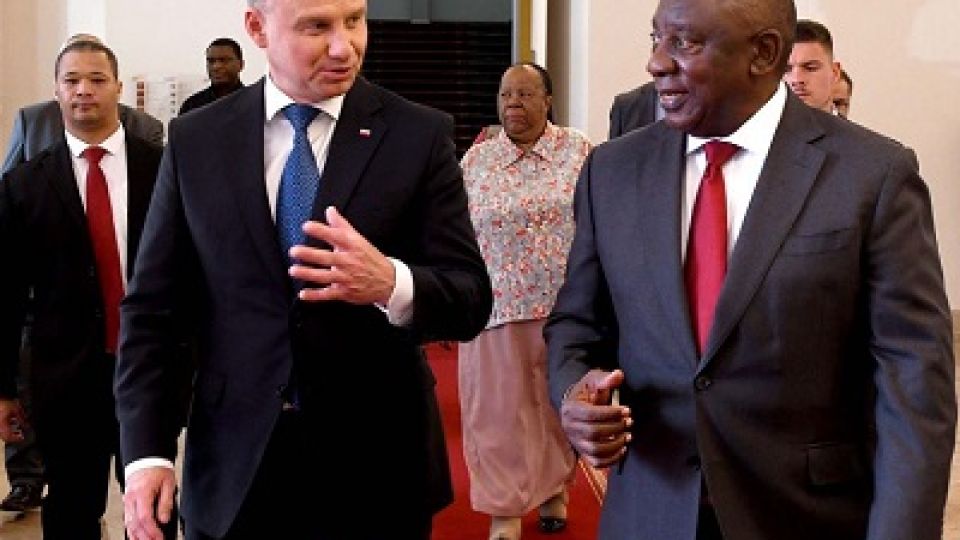by TINTSWALO BALOYI
JOHANNESBURG, (CAJ News) – THE widening rift between South Africa and Poland threatens to collapse relations that have been cordial since they were established between the two nations more than three decades ago.
The fallout, which came to the fore this past weekend, reflects how countries are getting caught up in the ceaseless conflict between Russia and Ukraine and the broader geopolitical rivalries.
A 16-month Russo-Ukrainian is putting paid to ties that have been nurtured for 31 years between Poland and the African country, which has lurched into inarguably the biggest conundrum of all the African countries as they strive to maintain the policy of non-alignment.
Last Thursday, Polish authorities detained, at Warsaw Chopin Airport, a plane carrying members of the security team of South African President Cyril Ramaphosa, who was part of a delegation of African leaders on a peace mission to Russia and Ukraine.
Poland’s Ministry of Foreign Affairs stated the situation resulted from a failure to comply with standard entry procedures required by the Polish side.
The statement added that “dangerous goods” were on board the plane, which South African representatives did not have permission to bring in.
“Dangerous goods” is somewhat a euphemism for weapons.
“In addition, there were persons on board the aircraft whose presence the Polish side had not been notified beforehand,” the foreign affairs ministry stated of the plane that also had journalists aboard.
The ministry implied that South Africa had been defiant, considering three consultation meetings had been held and representatives of the Ministry of Foreign Affairs remained in constant contact with the South African advance team of President Ramaphosa’s Office and the South African Embassy in Warsaw.
“The South African side had been informed of all formalities necessary for the delegation’s entry into Poland and the required transport permits,” it stated.
The South African delegation was quoted accusing Poland of racism.
The plane never reached its intended destinations, Russia and Ukraine, and instead was scheduled to return to South Africa this past weekend.
However, this is the latest twist in relations between Poland and South Africa being strained, with the Russo-Ukraine war at the centre of the tiff.
The plane drama in Warsaw came in the wake of reports of South Africa’s decision to ban arms sales to Poland. It was argued Poland would support Ukraine with these arms to support Ukraine against Russia.
Critics of Ramaphosa’s African National Congress (ANC) argue the move was influenced by a need by South Africa to maintain relations with Russia, whose relations with Poland are at an all-time low.
Further complicating issues, in May, the United States top envoy in South Africa accused the latter of supplying arms to Russia.
Like most of the continent, South Africa is in a dilemma in that while it is committed to the non-aligned stance, it has long-running relations with Russia, a fellow Brazil, Russia, India, China and South Africa (BRICS) bloc member.
Poland on the other hand, like most of Europe, has sided with Ukraine. Russia is under sanctions from neighbouring Poland following its war with Ukraine.
South Africa is caught in the middle.
It has until recently enjoyed friendly ties with the Polish since relations were established in 1991, three years before majority rule in South Africa.
Poland perceives South Africa as a priority partner in Africa, both in terms of bilateral relations and strategic partnership between South Africa and the European Union.
Both countries have cooperated in some initiatives at the United Nations (UN), especially in the field of human rights protection. Human rights have been violated during the Russo-Ukrainian conflict.
South Africa-Russia relations (since 1942) run longer than the Poland-South Africa ties. Most importantly, Russia supported South Africa to gain freedom as the Western bloc rallied behind the Apartheid regime.
It has emerged that Janusz Jakub Waluś (70), the Polish right-wing extremist convicted of the 1993 assassination of South African anti-apartheid activist, Chris Hani, is also at the centre of the diplomatic tiff.
Initially sentenced to death, later commuted to life imprisonment, he was released on strict parole at the end of 2022.
The parole will last for two years, during which he is barred from leaving South Africa.
Poland has reportedly been unsuccessful in requests for Waluś to be freed and repatriated.
South Africa has faced immense pressure, most vocally the United States (US), and from the local opposition Democratic Alliance (DA), to condemn Moscow, and arrest Russian President Vladimir Putin if he attends the BRICS Summit in Johannesburg in August, but the African country has been unyielding in its stance.
“Over the past two days, President Cyril Ramaphosa has disgraced South Africa on the global stage,” John Steenhuisen, leader of the main opposition Democratic Alliance, stated this past weekend.
He said not only did the Presidency “lie” about being unaware of missile strikes on Kyiv while the peace mission was in Ukraine.
“His (Ramaphosa’s) administration’s sheer incompetence caused a planeload full of his bodyguards, journalists and apparently unauthorised weapons to be denied entry to both Poland and Ukraine,” Steenhuisen said.
The opposition leader ridiculed the peace mission to Russia and Ukraine as a “failed Public Relations stunt.”
Ramaphoa was part of a seven-member team of African heads of state and top envoys that embarked on the mission to Russia and Ukraine.
Other leaders and emissaries were from Comoros, Congo, Egypt, Senegal, Uganda and Zambia.
Of these countries, at the General Assembly Resolution ES 11 voted on Russia’s invasion of Ukraine, Comoros, Egypt and Zambia approved the condemnation of Russia.
The other four abstained from voting.
Critics wondered how a continent that had failed to “silence the guns” in its backyard would broker peace abroad.
The leaders met Ukraine President Volodymyr Zelenskyy on Friday and Putin on Saturday, minus the Ramaphosa delegation grounded in Poland.
“The Africa Peace Initiative has been impactful and its ultimate success will be measured on the objective, which is stopping the war,” Ramaphosa stated.
– CAJ News

